开放英语3教案- (要点) Unit 8 Leisure
- 格式:doc
- 大小:100.50 KB
- 文档页数:15
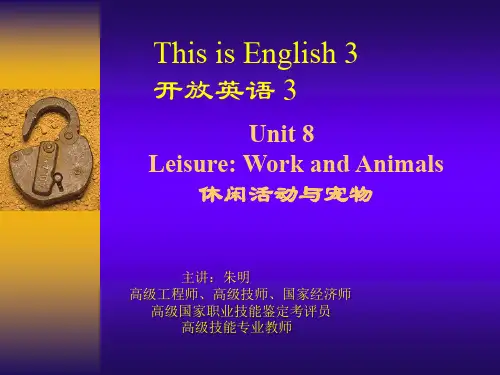
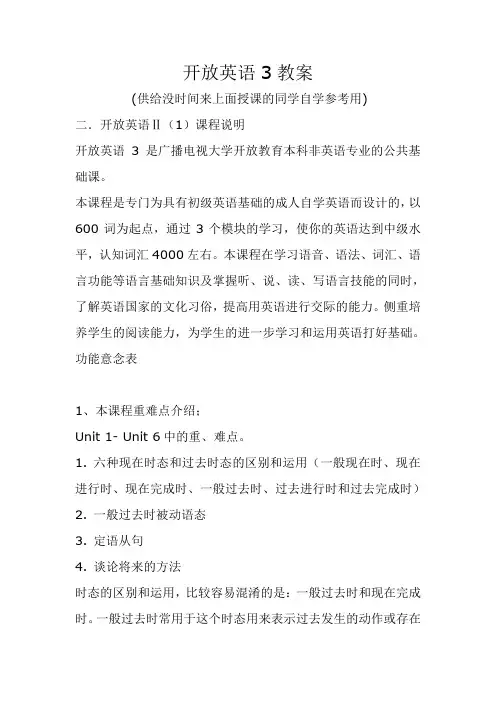
开放英语3教案(供给没时间来上面授课的同学自学参考用)二.开放英语Ⅱ(1)课程说明开放英语3是广播电视大学开放教育本科非英语专业的公共基础课。
本课程是专门为具有初级英语基础的成人自学英语而设计的,以600词为起点,通过3个模块的学习,使你的英语达到中级水平,认知词汇4000左右。
本课程在学习语音、语法、词汇、语言功能等语言基础知识及掌握听、说、读、写语言技能的同时,了解英语国家的文化习俗,提高用英语进行交际的能力。
侧重培养学生的阅读能力,为学生的进一步学习和运用英语打好基础。
功能意念表1、本课程重难点介绍;Unit 1- Unit 6中的重、难点。
1. 六种现在时态和过去时态的区别和运用(一般现在时、现在进行时、现在完成时、一般过去时、过去进行时和过去完成时)2. 一般过去时被动语态3. 定语从句4. 谈论将来的方法时态的区别和运用,比较容易混淆的是:一般过去时和现在完成时。
一般过去时常用于这个时态用来表示过去发生的动作或存在的状态。
它既可以指某次具体的动作,也可以指重复性的动作, 常与表示过去特定时间的状语连用。
例如:When I was a little girl, my brothers and I collected stamps for many years.而现在完成时表示过去发生的动作或事情对现在的影响或产生的结果,着眼点在现在。
现在完成时常与不确定的过去时间状语连用,如:just, before, once等,也同包括现在时间在内的时间状语连用,如:now, today, this morning, this month, this year等。
但不能同特定的过去时间状语连用,如:in 1933, last year等。
或表示一个从过去某个时间开始,延续到现在,并可能延续下去的动作。
常同表示一段时间的状语连用,如:so far, since, for a long time, for the last few years等。
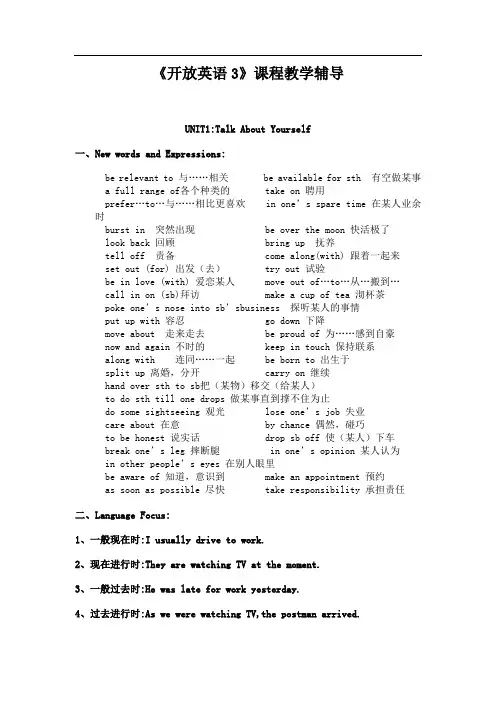
《开放英语3》课程教学辅导UNIT1:Talk About Yourself一、New words and Expressions:be relevant to 与……相关 be available for sth 有空做某事a full range of各个种类的 take on 聘用prefer…to…与……相比更喜欢 in one’s spare time 在某人业余时burst in 突然出现 be over the moon 快活极了look back 回顾 bring up 抚养tell off 责备 come along(with) 跟着一起来set out (for) 出发(去) try out 试验be in love (with) 爱恋某人 move out of…to…从…搬到…call in on (sb)拜访 make a cup of tea 沏杯茶poke one’s nose into sb’sbusiness 探听某人的事情put up with 容忍 go down 下降move about 走来走去 be proud of 为……感到自豪now and again 不时的 keep in touch 保持联系along with 连同……一起 be born to 出生于split up 离婚,分开 carry on 继续hand over sth to sb把(某物)移交(给某人)to do sth till one drops 做某事直到撑不住为止do some sightseeing 观光 lose one’s job 失业care about 在意 by chance 偶然,碰巧to be honest 说实话 drop sb off 使(某人)下车break one’s leg 摔断腿 in one’s opinion 某人认为in other people’s eyes 在别人眼里be aware of 知道,意识到 make an appointment 预约as soon as possible 尽快 take responsibility 承担责任二、Language Focus:1、一般现在时:I usually drive to work.2、现在进行时:They are watching TV at the moment.3、一般过去时:He was late for work yesterday.4、过去进行时:As we were watching TV,the postman arrived.5、连接句子:He didn’t go to school yesterday because he was ill.6、used to do sth与be/get used to doing sth的区别使用eg.(1) I used to talk to everyone a lot,but now we communicate by email most of the time.(2) Did you get used to writing email?三、Topic:Describing yourself and others交际用语1(1)问候:Hello/Hi.Good morning/afternoon/evening, etc.(2)告辞I'm afraid I must be going now.I think it's time for us to leave now.I've really got to go now.It's time I went home.(3)告别Good-bye/Bye/Bye-bye.Good night.See you tomorrow.(4)介绍A. This is Tom (and this is Amy).I'd like you to meet Mary.May I introduce (you to) Mr./Mrs./ Miss/Ms. Smith?B. How do you do?Glad to meet you.Nice meeting you, Fred.(5)感谢和应答A. Thank you (very much).(Many ) thanks.I'm really gratefu·to you for your help. (6)祝愿和祝贺A. Good luck!Best wishes for your holiday.Have a good time.Please give my best wishes to Linda.Please remember me to your family.B. Congratulations (on your success).(7) 道歉和应答A. Sorry.Excuse me.B. Never mind.It doesn't matter.That's nothing.(8)邀请和应答A. Come in and have a cup of tea.What about having a drink?Would you like some ice cream?B. Thank you (very much).Yes, I'd love to.That's very kind of you, (but I'm on a diet)(9)提议、接受和谢绝A. Can I help you?Is there anything I can do for you?Shal·I carry the box for you?B. Yes, please.No, thank you (just the same).That's very kind of you, but I can manage it myself.(10)开始和结束谈话Nice day, isn't it?What a lovely day today!UNIT 2 Family Influences一、New words and Expressions:tell off 责备 come along(with) 跟着一起来set out (for) 出发(去) try out 试验be in love (with) 爱恋某人 move out of…to…从…搬到…call in on (sb)拜访 make a cup of tea 沏杯茶poke one’s nose into sb’sbusiness 探听某人的事情put up with 容忍 go down 下降move about 走来走去 be proud of 为……感到自豪二、Language Focus:1、一般过去时被动语态:She was seen first by the local doctors.2、短语动词:to bring sb up,to put up with sb,to take after sb3、used to/would(1)My brother never used to come to the fair with us.(2)I would invite some friends to come along with me.4、always/forever/to keep doing sth的区别使用:He’s forever checking his hair in the mirror.5、doing用于描述行为:She keeps phoning up to see if I am getting better.三、Topic:Describing your family and family relationships交际用语2(1)请求重复和解释Uh, excuse me, could you repeat it?Could you say that again?(2)定义Linguistics may be defined as the science of language.(3)确认理解Got it?Do you see what I mean?(4)犹豫Let me see.How can I put it?(5)更正What I meant was that we should go on with the work.(6)补充In addition, I think we should take the cost into account.(7)插话Excuse me. Did you say that the party had to be put off?(8)意愿I'm willing/ready to take the job.I wil·buy a new pair of glasses.(9)希望I wish to see you again.I hope you wil·get better soon.I wish I were younger.(10)意向I'm planning to move somewhere downtown.I fee·like taking a hot bath now.(11)责任Do I have to finish it today?Should I look after the baby this evening?Is it necessary for me to clean the room?I'm afraid you must/wil·have to stay home. (12)能力I can manage the job without help.I'm capable of running a mile in four minutes. (13)允许A. I wonder if I could possibly use your bicycle?B. Sure, go ahead.C. I'd rather you didn't.(14)同意和不同意A. That's a good point.B. I'm afraid you're not quite right. (15)喜欢和不喜欢A. I like English poems very much.She loves doing shopping alone.B. He doesn't like wearing his hair long.I don't care much for hot food.(16)偏爱I prefer tea to coffee.I'd rather go by train than by plane. (17)原谅It's not your fault.Please don't blame yourself.(18)后悔I should have finished my essay earlier. (19)慰问和同情I'm so sorry.Please accept my deep sympathy.(20)兴趣That's quite tempting.I'm curious about that.(21)决心She's determined to go to Australia.I insist everybody be here at six sharp.Nothing wil·prevent me from accomplishing the task. (22)责怪和批评You are late again.Why didn't you tel·me the truth?You shouldn't have done that.(23)抱怨I hate to have to say this, but it's too noisy here. (24)否定I don't think you are right.(25)让步Even so/But it's still a fact.(26)怀疑I doubt if we can finish it on time.I suspect the truth of her statement.(27)犹豫Well, let me see.(28)坚持But you know that she's innocent.(29)忍受Well, we just have to accept that sort of thing.(30)冷淡I don't care what you do.It doesn't matter to me.UNIT 3 Society and Family Life一、New words and Expressions:now and again 不时的 keep in touch 保持联系along with 连同……一起 be born to 出生于split up 离婚,分开 carry on 继续hand over sth to sb把(某物)移交(给某人)to do sth till one drops 做某事直到撑不住为止二、Language Focus:1、描述趋势 nouns/serbs:rise,fall,etc.adjectives:sharp,slow,etc. adverbs:sharply,slowly,etc.2、现在完成时 The minimum wage has increased,but it is not enoughto stop poverty.3、But/so There has been a steady rise in production,so we haveemployed more staff.4、描述习惯 She goes to the hairdresser’s once a month.5、描述关系 to fall in love with sb ,to get on(well)with sb.三、Topic:Talking about changes in the family and society 谈论家庭与社会的变化交际用语3(1)肯定和不肯定I'm not quite sure whether it wil·rain today.(2)可能和不可能It is possible that he is out.It is unlikely that he should be at home. (3)预测It will be fine tomorrow.(4)猜测和相信I guess that he has got it.He must have read it before.We al·believe that you are right.(5)看似、好象He seems to be ignorant about it.She appears to be unwilling to go.It looks as if he knew a lot about it.交际用语4(1)惊奇What a surprise!I can hardly believe my ears/eyes.(2)满意和高兴It is wel·done.I'm pleased to know that.How wonderful!(3)愤怒或恼怒Isn't it annoying/irritating!What a stupid idiot!(4)悲伤Oh, no! How could this happen to me?I can't take much more of this.(5)愿望I wish I were young again.(6)悔恨和失望Oh, what a pity /shame!That's too bad.(7)需求I need your help.I want you to read this report.(8)焦虑I'm so anxious about my job.She is rather worried about his health. (9)加重感情色彩What a wonderfu·day!Thank you ever so much.It is far, far too expensive.(10)担心和挂念I'm so worried about you.She is anxious to know the result.Don't be afraid.I was frightened to death when a tal·man ran towards me.(12)期望I'm expecting a call.(13)赞赏What a marvelous play!I like your haircut.UNIT 4 Changes in Life一、N ew words and Expressions:二、Language Focus:1谈论过去 When he was 65,he decided that he didn’t want to stop.2 谈论将来 Next month I’mhaving discussions with an agent in Brazil.3 表示将来的时间状语the day after tomorrow,Tuesday week,a week tomorrow4 用here/there及one I am writing to you from Rio5 避免重复 We’ve been here since Sunday.6 定语从句 I listened to journalists that/who were excited about the changes.7 表述看法 The best thing is the beautiful sea.三、Topic:Describing changes in your own or another’s life描述自己或他人生活中的变化交际用语6(1)提醒Make sure you'l·be there on time.Don't forget about your study.Will you do me a favour?Would you mind helping me with the desk?(3)建议You'd better take an umbrella.I'd rather you did it again.Why don't you have a try?Let's take a short break.Shal·we start now?(4)推荐I recommend this book.(5)指导The first thing you have to do is open the cover, and then don't forget to press the button 'ON'.(6)警告Be careful!Take care!If you don't do it properly, I'l·make you do it again.(7)劝说Don't you think it would be better to leave right now?(8)命令Be quiet.Don't shout in the corridor.You can't smoke here.You are not allowed to smoke here.(10)许诺I wil·pay you back next time.I give you my word that the goods wil·arrive on time.UNIT 5 Ambitions and Dreams一、N ew words and Expressions:二、Language Focus:1、过去完成时 Befor I left on the trip,I had trained hard and got veryfit.2、Travel/journey/ Travel by train is slow.3、Trip/voyage I made three journeys by plane last year.4、谈论性格与职业 She likes taking responsibility.She has a good eye fordetail.5、谈论将来 She’s going to get married next year.I plan/I’m planning to buy a new house this year.三、Topic: Talking about achievements your career hopes for the future 谈论成就及对未来职业的理想交际用语7(1)时刻She gets up at 7:00 every morning.The schoo·wil·begin in September.(2)时段The concert lasted two hours.His father wil·stay in Paris for five years.(3)频度He should take the medicine twice a day.She usually wrote home every other week.(4)时序He should take the medicine twice a day.She usually wrote home every other week.(5)速度The students can read English at the speed of 200 words per minute.(6)同时Strike while the iron is hot.(7)持续The professor has been teaching at the university for over thirty years.交际用语8.(1)存在和不存在Air exists nearly everywhere.There is not a sou·in the room.(2)有和没有The people in this country enjoy free medica·care.The factory ran out of raw material.UNIT 6 Review and Assessment(Unit1--5)UNIT 7 An Englishman’s Home is His Castle 我爱我家一、N ew words and Expressions:put in 安装 make friends 交朋友complain about 抱怨,投诉 disappointed with 失望的set up 成立,建立 to tidy sth up 收拾,整理to apologise for 道歉 to look into sth 调查to put sth in writing写下来 sort sth out 整理,分类on duty 值班,上班 take place 发生in advance 预先 irrespective of不顾的,不考虑的be better off 状况好的 keep weight off保持体重不增长a couple of 两三个 stick to 坚持as a result of…作为……的结果 try to do 最好能做,尽量去做二、Language Focus:1 to need doing The roof needs repairing.2 to need to do We need to repair the roof.3 to have /get sth done Have they had the broken windowpanes replaced yet?4 描述方位,位置 in the north/south/east/west of…;further in/further out,etc.35 描述感觉 It’s good/etter/nice+doing6描述外观 That house looks old7therefore They thought that the agent didn’t do enough,therefore John was asked to write to him.8Although Although he was very wealthy,he was very mean.9However He was very wealthy.However,he was very mean.10形容词和介词的搭配 angry about,appalled by ,concerned about,etc. 11表示抱怨和道歉 I must apologise about the painting.12 书信的写作地址,日期,称谓,正文,结束语及落款的书写格式.三、Topic: Learning language related to house and home 学习有关家庭居住情况的内容交际用语9. 空间描述(1)位置He sits at the back of the room.The lab lies in the center of the university.(2)方向The post office is two blocks straight ahead.Turn left at the corner and go straightforward.(3)动向The train is leaving for Beijing.towards; from(4)距离The schoo·is within walking distance.(5)体积The two rooms are of the same size.The swimming poo·is 25 metres in width, 50 metres in length and 2 metres in depth.交际用语10. 数量(1)数There are twenty students in the class.(2)量She has collected a great number of foreign stamps.There was a great amount of rain last month.(3)足量和不足量They have ample food and clothing.The pot plant died from want of water.(4)过量The shirt is too large for Tom to wear.UNIT 8 Leisure, Work and Animals 休闲活动与宠物一、N ew words and Expressions:二、Language Focus:1 表示歉意 a large(small)proportion of …; over…; under…;more than…; less than…2to spend time doing Jack spends under a third of his free time doing housework.3现在完成进行时 He hasn’t been working here for very long.4For I’ve been living here for three months.Since I’ve been living here since last March.三、Topic: Looking at leisure activities and animals as pets or for work 学习有关的休闲活动及宠物与人的关系内容交际用语 11.质(1)形状It is a U-shaped road.(2)颜色The leaves turn yellow in autumn.(3)材料The box is made of wood.(4)感觉The blind man has to fee·his way forward.He has no sense of music.(5)质地The silk feels very smooth.(6)价值A peasant woman found a priceless stone in her land.(7)自然状况I don't fee·well, just because of the jet-lag.交际用语12. 方法和手段The sheets are usually folded in this way.He decided to treat the patient surgically.The dumb can make themselves understood by means of gestures.UNIT 9 The Olympic Games 奥运会(PPT课件)一、N ew words and Expressions:二、Language Focus:1 一般过去时被动语态The Olympic torch relay was not introduced until19322 动名词 After winning the bid ,major construction began in Beijing. 3其实条件句 If we bid for the games, we will promote the country.构词法(后缀) politics/political/politically/politician三、Topic: Learning about the ancient and the modern Olympic games 了解奥运会的有关情况UNIT10 Health and Leisure 健康与休闲一、N ew words and Expressions:二、Language Focus:1 祈使句 Always take the stairs.2 用should 提出忠告 You should look for exercise opportunities all the time. The patient should not be moved.3 虚拟条句 If I had the time ,I’d make something better.4 用虚拟条件句提出忠告 If you stretched befor you start ,you wouldn’t get sore muscles三、Topic: Learning about personal fitness and dieting 学习有关健身与饮食习惯的内容交际用语13. 功用The knife is used to cut things.The computer performs an important function in modern society.交际用语14. 立论(1)例证The language skills, for example, speaking and writing, need to be practised.This relationship can be exemplified by the following graph.namely; as follows(2)概括Generally speaking, job chances are much better for manua· workers than for office workers.(3)推论It is argued that books wil·no longer be necessary after each family owns a computer.(4)结论To sum up, it is no easy job to learn a foreign language.All in all; in conclusion; to conclude by saying…(5)阐明It means you mustn't overtake.UNIT 11 Health Care, and Travel and Health 保健与健康一、N ew words and Expressions:二、Language Focus:1 现在进行时被动语态 This high rate of infection is being blamed on the appelling hygiene conditions.2 过去进行时被动语态 Last week more than 200 people were being treated in a Glasgow hospital.3 间接引语 She told me she hadn’t slept well before the flight.三、Topic: Looking at public health care ,and the travel and health 学习有关公共卫生保健和施行健康的内容交际用语15. 计算和测量(1)基础运算If you multiply 3 by 4, you get 12.(2)倍数和百分比In this school, men constitute only 40% of the teaching staff.(3)增加和减少The export increased in volumn by 10 percent over last year.There is a sharp drop of birth rate in this area.(4)基础测量(长、宽等)The table is four feet in length.The garden measures forty feet across.(5)近似值about; approximately(6)平均值On the average, the author writes two books a year.to have an average of(7)比率和比例16 to 8 is in ratio of 6 to 3.The proportion of A to B is X to Y.(8)最大值和最小值The train has the maximum speed of 250 miles per hour.The minimum number of students in each room will be five.(9)估计The estimated quantity of rice per acre is 5 tons.It is estimated that the work wil·take three months.UNIT 12 Review and Assessment(Units7~11)复习与自测UNIT 13 Education at School and University 学校教育一、N ew words and Expressions:a range of 各种的 as well as 而且,还make ends meet 使收支平衡 up and down 来回full range of 一整套的 online tutoring网上辅导课in particular 特别 be engaged in 参加video conferencing 视频会议 long term 长期的at great speed 高速的 push forward 推动make way for 给……让出地方 a variety of 各式各样的hold up 使……停顿 back up 排成长龙knock down 拆 chop down 伐倒due to 由于 compared with 与……比较switch on 打开 out of sight 在看不见的地方to prevent sth from happening 防止某事发生adapt to 适应 end up 最后处于in a sense 在某种意义上讲 get around 回避二、Language Focus:1 情态动词表示义务 In many secondary schools children must wear a uniform.2 if/when If I get the teaching qualification,I’ll teach history.When he gets back,I’ll telephone you.3 动名词与动词不定式 I began learning English five years ago.Don’t forget to post the letter.三、Topic: Learning about some aspects of education in the UK 学习有关英国学校教育的内容交际用语16.结构(1)部分和整体The committee comprises nine professors.Our class consists of 40 students.(2)部分之间的联系The staircase leads to the balcony.交际用语17.关系(1)行为中和事物中的联系They showed sympathy to the child.These facts are known by al·the schoolteachers.(2)对比关系on the one hand… on the other hand…; in spite of; on the contrary (3)比较关系He speaks English as well as she does.He is the slower of the two children.That is the most wonderful play I have ever seen.(4)所属关系her promotion; a woman's college(5)逻辑关系As it was raining hard, we didn't go out yesterday.Nothing more was heard from him so that we began to wonder if he was dead. Though it was already midnight, he went on working.He failed the exam as a result of bad preparation.(6)分类English can be further divided into several sub-varieties.UNIT 14Learning and Learning Styles 学习与学习方式一、N ew words and Expressions:二、Language Focus:1 非限定性定语从句 The sandwich course, which I have been on for a week ,is really excellent.2将来完成时 By the end of December the technicians will have installed the computers三、Topic:Learning about continuing education after school and university 学习与继续教育和学习方式相关的内容UNIT 15 Town Life 城市生活一、N ew words and Expressions:二、Language Focus:1 现在进行时被动语态 A factory is being converted into an art gallery.2 现在完成时被动语态 Our old house has not been demolished.3 already/still/yetHas the shopping mall been opened yet ?The old school has already demolished.The office block is still being completed.三、Topic: Learning about urban redevelopment and transport 学习与城镇及其发展相关的内容UNIT 16 Crime and Justice犯罪与司法一、N ew words and Expressions:二、Language Focus:1 情态动词表示劝告 You mustn’t go through a park alone at night.2 反意疑问句 Burglaries are going down ,aren’t they?2表达因果关系 Poor health can be due to unemployment.4 动词与介词的搭配 to convert sb of sth,to arrest sb for sth三、Topic:Looking at crime and the justice system 了解有关犯罪与司法的内容UNIT 17 Live and Let Live 和谐共处一、N ew words and Expressions:二、Language Focus:1 表达歉意 Nearly all ,hardly any ,none , etc.2 间接引语和间接问句 The interviewer asked what he had done.She asked me if /whether I was English.3 反意疑问句 English people don’t talk about personal things,do they? 3tell/ask He asked me about English culture.He told me not to stay in central London because三、Topic: Looking at different cultures and living in a multi-cultural society 了解多元文化及与不同风俗习惯相关的内容附录二语法项目表1、词类(1)名词(2)形容词(3)副词(4)动词(5)代词(6)冠词(7)数词(8)介词(9)连词 (10) 惊叹词2、名词(1)可数和不可数名词(2)名词的复数形式(3)专有名词(4)所有格3、代词(1)人称代词(2)物主代词(3)反身代词(4)指示代词(5)不定代词(6)疑问代词(7)关系代词4、数词(1)基数词(2)序数词(3)分数(4)小数(5)百分比5、介词6、连词7、形容词(1)形容词作定语、表语、宾语补足语(2)比较等级:原级/比较级/最高级8、副词(1)功能:表示时间、地点、方式、程度、关系等(2)比较等级:原级/比较级/最高级9、冠词10、动词(1)基本形式A.现在时B.过去时C.过去分词D. -ing形式(2)行为动词的及物性和不及物性(3)系动词:be, get, look, seem, turn, grow, become等(4)助动词:be, do, have, shall, will等(5)情态动词:can, may, must, ought to, need, dare等(6)时态A.一般现在时B.一般过去时C.一般将来时D.现在进行时E.现在完成时F.过去进行时②G.将来进行时H.将来完成时②I.一般过去将来时③J.现在完成进行时③K.过去完成进行时③L.过去完成时②(7)被动语态A.被动语态的不同时态·一般现在时·一般过去时·一般将来时·现在进行时·现在完成时·过去进行时·过去完成时·将来完成时·一般过去将来时·过去将来完成时B.带情态动词的被动语态(8)动词的非谓语形式A.不定式·作主语·作宾语·作宾语补足语·作状语·作定语·作表语·在复合结构中·完成式、进行式和完成进行式·被动形式B.动词的-ed 形式·作定语·作表语·作宾语补足语·作状语C.动词的-ing形式·作主语·作宾语·作宾语补足语·作表语·作定语·作状语·在复合结构中③·完成形式和被动形式③(9)虚拟语气11、句子(1)句子的成分(2)句子的种类(3)简单句的基本句型(4)并列句(5)复合句·名词性从句②(宾语从句1)·状语从句·定语从句(6)倒装句(7)省略句(8)强调句(9)插入语12、标点符号13、构词法(1)转化(2)合成(3)派生A.常用前缀·表示“否定”:non-, un-, in-, dis-, im-③·表示“再次”re-·表示“互相”:inter-③·表示“中间”:mid-③·表示“错误地”:mis-③·表示“上,过度”:over-③·表示“下,低于”:under-③·表示“小”:mini-③·表示“多”:multi-③B.常用后缀·名词后缀:-er, -tion, -ese, -ist, -ing, -ment, -ness, -ian②, -or③, -ion③,-ation③, -ence③, -hood③, -ity③·动词后缀:-ify, -ize, -ise, -en·形容词后缀:-able, -ful, -y, -ive②, -al②, -an②, -ible ③,-ic③, -ical③, -less③, -ous③·副词后缀:-ly·数词后缀:-teen, -ty, -th附录三语言技能表2、阅读(1)理解主旨要义;(2)理解文中具体信息;(3)根据上下文推测生词词义;(4)进行有关的判断、推理和引申;③(5)理解文中的概念性含义;③(6)理解文章的结构及单句之间、段落之间的关系;②(7)理解作者的意图、观点或态度;②(8)区分观点、论点和论据。

英 3 Unit 3 Society and Family Life 社会与家庭生活—Talking about changes in the family and society谈论家庭与社会的变化学习目标1.描述发展趋势—名词/动词/修饰语(形容词/副词)①动词rise / increase /go up ; fall /decrease /decline /go down(用过去时描述过去某一时间/阶段发生的变化趋势;用现在完成时发生在过去但现在还在持续的变化趋势)Inflation fell from 8% in 1992 to 6% in 1995.通货膨胀从1992年的8%降到1995年的6%。
Inflation fell by 2% between 1992 and 1995.通货膨胀在1992年到1995年间下降了2%。
In general, unemployment has risen.总体上看失业率在上升。
Unemployment has gone up rapidly from 4%in 1997 to 8% now.失业率从1994年的4%迅速上升到现在的8%。
②名词 a rise /an increase in;a fall / a decrease /a decline in③形容词/副词(修饰/限定变化趋势)slow / slowly 慢的/慢慢地slight / slightly 微小的/地steady / steadily 平稳的/地rapid / rapidly 迅速的/地sharp / sharply 明显的/地significant / significantly显著的/地(形容词放在名词前;副词放在动词后)There has been a slight rise in population. 人口一直缓慢增长。
Unemployment has gone up slowly. 失业率缓慢上升。

Unit 1英文信件的格式:一般现在时和现在进行时练习:选用适当的时态填空。
1. She is staying (stay) with her sister at the moment.2.Hurry! The train is coming. (come).I don’t want (not want) to miss it.3. The Huangpu River flows (flow) into the East China Sea.4. The river is flowing (flow) very fast today.5. Does it snow (it / snow) in Kunming in winter?改写下列句子:1.Where you live?Where do you live?2.How spell your name?How do you spell your name?3.Where you staying this month?Where are you staying this month?4.Who do work for?Who do you work for?5. You like the film?Do you like the film?复习一般过去时和过去进行时练习:选用适当的时态填空。
1.W e _lived_ (live) in Manchester from 1987to 1994, but we have moved to Liverpool now.2.W hen we were kids, we _went_ (go) to3.I_was playing_ (play) basketball at 3 o’clock yesterday afternoon.利用所给的特殊疑问词提问:1.M y brothers and I collected stamps for many years. (What)What did your brothers and you collect for many years?2.S he worked in the post office on Saturdays. (When)When did she work in the post office?3.T he students were playing football on the playground. (Who)Who were playing football on the playground?4.S he didn’t go to school yesterday, because she is ill. (Why)Why didn’t she go to school yesterday?连接下列的句子:(and, but, although, because, with)1.W e were very excited. England were playing West Germany in the final.We were very excited because England were playing West Germany in the final.2.S he wasn’t watching the match. She was listening to it on the radio.Although She wasn’t watching the match, She was listening to it on the radio.She wasn’t watching the match, but She was listening to it on the radio.3.I t was a limited edition. It had ENGLAND WINNERS on each stamp.It was a limited edition with ENGLAND WINNERS on each stamp.4.W e still have it today. Perhaps it is worth a lot of money.We still have it today, and perhaps it is worth a lot of money.《直通车》模拟自测1Use of English1. -Nice weather, isn’t it? - _____________.A. I’m not sureB. You know it wellC. Yes, it isD. Yes, it isn’t.2. –I think the Internet is very helpful. -_____________.A. Yes, so do IB. That’s a very good ideaC. Neither do ID. I’d rather go surfing on it.3. –What subjects are you studying? -_____________.A.Yes, I’m studying historyB.I’m studying nowC.I’m studying philosophyD.I’m doing my homework4. –Which language do speak at home? -_____________.E.I speak English very wellF.I can speak English and FrenchG.English is my mother tongue5.-Must we hand in our homework now? -____________.A. Yes, you willB. Yes, you mustn’tC. No, you needn’tD. No, you mustn’t6. –Help yourself to the steak, Maggie. -_____________.I.Sorry, I’ve had enoughJ.Thank you, HelenK.Yes. But it isn’t cooked wellL.Help yourself to it, too7. –Go that way and take a seat. - _____________. M.N o, I’m not tiredN.Thanks, but I’d rather standC. Yes, that’s a good wayD. It doesn’t matter8. –Are you sure about that? - _____________. O.You needn’t worry about thatP.I like the ideaQ.Oh, no. I’m afraid of thatR.Oh, yes. I’m absolutely positive- _____________.S.I’ve never been thereT.The next one is fasterU.They leave every hourD. The city is far away10. –There’s a new cafeteria at the corner. How about going there for supper?- _____________.A.Fine. But it’s my treat this timeB.It’s newly decoratedC. Let’s look at the menu firstD. I have no idea about what to order1.O n his first sea ___, he was still quite young but showed great courage to face the storms.A. tripB. travelC. tourD. voyage2.L et me __ the case carefully before I draw a conclusion.A. look upB. look intoC. look afterD. look out3.H e, as well as I, ___ a student.4.T he farmer caught the boys ___ his apples.A. stealingB. stoleC. to stealD. would steal一、交际用语二、词汇与结构三、完型填空四、阅读理解五、书面表达(15分)Unit 2used to 和would 的用法(*P27-Language Focus)Unit 2used to 和would 的用法(*P27-Language Focus)27. Ancient Greece is the ____ of western civilization.A. originB. sourceC. placeD. sources28. His attitude toward us seems ____.A. nicelyB. warmlyC. kindlyD. friendly30. I know this is the secret between you and me, and I promise never to ___ it to anyone else.A. mentionB. talkC. speechD. announce31. In addition to rice, we need to ____ our diet with fish, meat and vegetable.A. supplementB. replaceC. addD. eat32. ____, we keep records on all the experiments so that we may have enough data.A. As a wholeB. As a ruleC. On the averageD. By all means33. No one can possibly recall any detail about the meeting. It is at least five years since it ____.A. had taken placeB. was taken placeC. took placeD. was taking place34. He, as well as I, ____ a student.A. beB. amC. areD. is35. Las month, he paid a visit to the village ____ he had once worked for five years.A. whereB. whichC. thatD. in that36. Frank plays ____ Alex.A.a lot more better thanB. much more better thanC. a lot better thanD. much more well than37. He seldom does his homework at school on weekdays, ____he?A. doesn’tB. isn’tC. doesD. is39. These plants are rather difficult ____.A. to look afterB. to be looked afterC. being looked afterD. looking after40. We advised him to give up smoking, ____ a lot of exercise.A. to doB. and to doC. and doD. and doing。
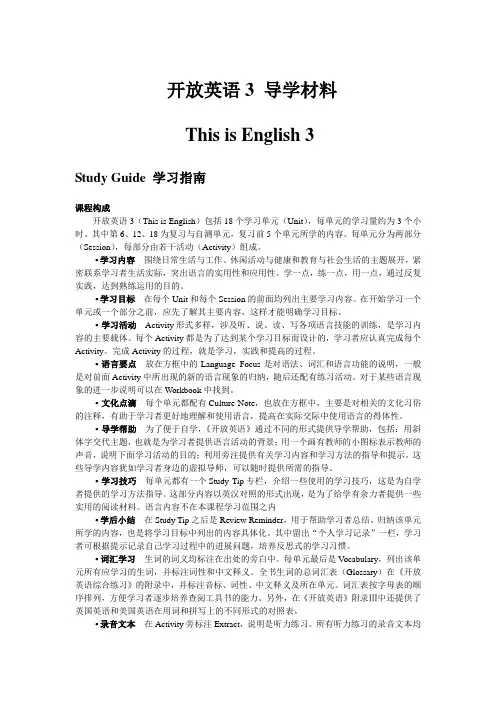
开放英语3 导学材料This is English 3Study Guide 学习指南课程构成开放英语3(This is English)包括18个学习单元(Unit),每单元的学习量约为3个小时。
其中第6、12、18为复习与自测单元,复习前5个单元所学的内容。
每单元分为两部分(Session),每部分由若干活动(Activity)组成。
·学习内容围绕日常生活与工作、休闲活动与健康和教育与社会生活的主题展开,紧密联系学习者生活实际,突出语言的实用性和应用性。
学一点,练一点,用一点,通过反复实践,达到熟练运用的目的。
·学习目标在每个Unit和每个Session的前面均列出主要学习内容。
在开始学习一个单元或一个部分之前,应先了解其主要内容,这样才能明确学习目标。
·学习活动Activity形式多样,涉及听、说、读、写各项语言技能的训练,是学习内容的主要载体。
每个Activity都是为了达到某个学习目标而设计的,学习者应认真完成每个Activity。
完成Activity的过程,就是学习,实践和提高的过程。
·语言要点放在方框中的Language Focus是对语法、词汇和语言功能的说明,一般是对前面Activity中所出现的新的语言现象的归纳,随后还配有练习活动。
对于某些语言现象的进一步说明可以在Workbook中找到。
·文化点滴每个单元都配有Culture Note,也放在方框中,主要是对相关的文化习俗的注释,有助于学习者更好地理解和使用语言,提高在实际交际中使用语言的得体性。
·导学帮助为了便于自学,《开放英语》通过不同的形式提供导学帮助,包括:用斜体字交代主题,也就是为学习者提供语言活动的背景;用一个画有教师的小图标表示教师的声音,说明下面学习活动的目的;利用旁注提供有关学习内容和学习方法的指导和提示。
这些导学内容犹如学习者身边的虚拟导师,可以随时提供所需的指导。
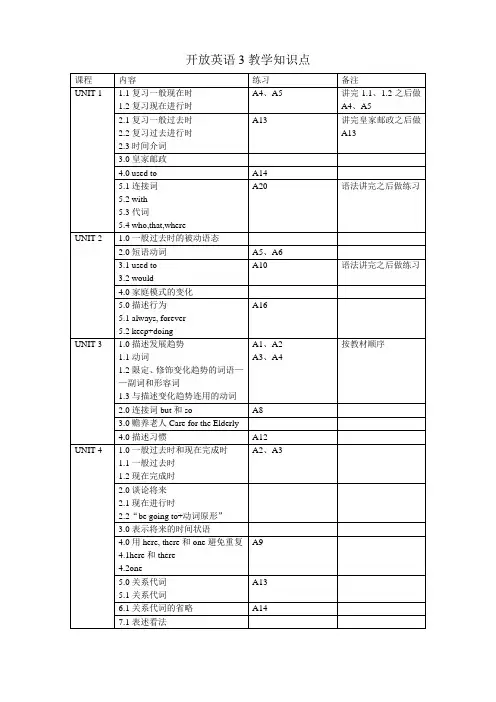
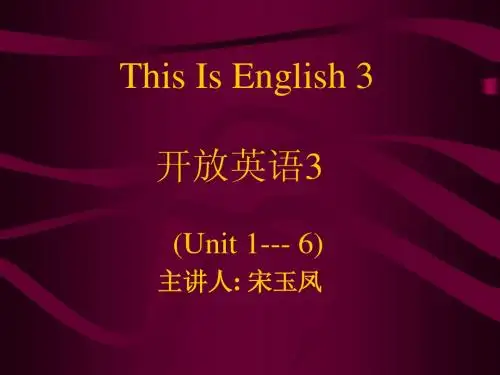
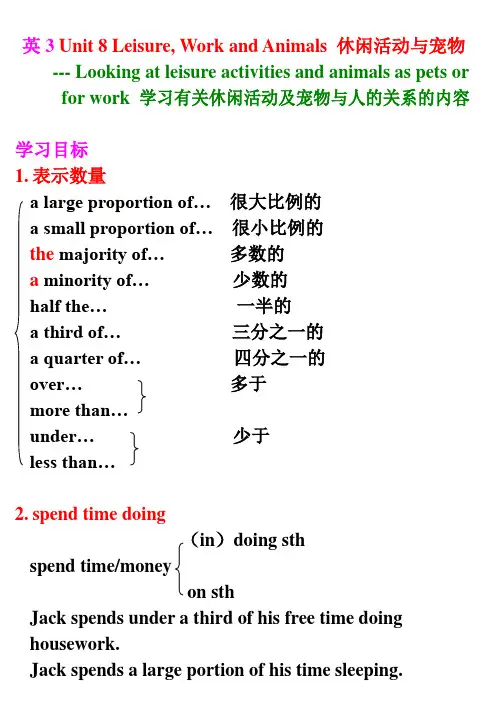
英3Unit 8 Leisure, Work and Animals 休闲活动与宠物--- Looking at leisure activities and animals as pets orfor work 学习有关休闲活动及宠物与人的关系的内容学习目标1.表示数量a large proportion of… 很大比例的a small proportion of… 很小比例的the majority of… 多数的a minority of… 少数的half the… 一半的a third of… 三分之一的a quarter of… 四分之一的over… 多于more than…under… 少于less than…2.spend time doing(in)doing sthspend time/moneyon sthJack spends under a third of his free time doing housework.Jack spends a large portion of his time sleeping.3.现在完成时和现在完成进行时现在完成时--- 强调动作的结果,表示动作已经结束现在完成进行时--- 强调动作从过去一直持续到现在,并且还要继续下去She has sorted out all the books and pictures. (已经)She’s been reorganizing the shop. (一直)Where has he been livin g?Who have they been working for?He hasn’t been working here for very long.注:状态动词可用于现在完成时,但不可用于现在完成进行时(love, like, hate, be, think认为/feel /hear/want)I’ve always liked animals.4.for和since表示时间for +时间段(①从过去到现在②过去③将来的一段时间)since +时间点(从过去某一时间点起到现在)(短语/句子)Franco: I lived in Sicily for 18 years. I came to London when I was 18. I’ve lived in England now foralmost 30 years.He's been here for ten minutes.He was here for ten minutes.I’m staying in Beijing on busines s for two weeks next month.I’ve been living here for three months / since last March. Since it started raining, I’ve stayed in the house.注: for和since与延续性动词搭配非延续性动词肯定式不可与其搭配(否定式可以)He has come here for two days. (×)He has been here for two days. (√)She hasn’t come here for two days. (√)I’ve not seen him since last week.5.词语比较/习语/句型/答案ed to do 过去常常做…be used to sth /doing 习惯于…2.because of +名词because + 句子3.the number of……数字/目(作主语时,谓语用单数)a number of…一些…(作主语时,谓语用复数)(in)doing sth4.spend time /moneyon sthpare A to B 把A与B相比; 把A比作Bcompare A with B 把A与B相比6.the majority of… 多数的a minority of… 少数的Actt.1 业余活动/描述发展趋势/表达数量p.126After hoursernment figures (in a recent survey) show that…8.after hours 工/业余时间9.for an average of three hours a day平均每天三个小时10.in /during the last /past 30 years 30年来/在过去30年间(常与完成时搭配)In the last more than 20 years great changes have taken place in China.11.because of +名词because + 句子12.washing machine 洗衣机microwave = microwave oven 微波炉vacuum cleaner 真空吸尘器13.etc = etcetera /it`set rə/ 等等14.the number of……数字/目(作主语时,谓语用单数)a number of…一些…(作主语时,谓语用复数)15.stereo / `st iəriəu/ 立体声的→立体声唱机16.leasure activity /time休闲活动/时间(in)doing sth17.spend time /moneyon sth18.55-64 year-olds = 55-64 year-old peoplepare A to B 把A与B相比; 把A比作Bcompare A with B 把A与B相比20.复习表示发展趋势动词This figure has fallen dramaticallyThe number of TVs…has also risen sharply…listening to tapes and records decreases with agegardening for pleasure rises sharply名词because of the increase in labour-saving devicesKEY1.They do less because of the increase in labour-savingdevices.s, stereos, videos, CD and DVD players, etc.3.More people watch TV.4.Older people.Animals at home21.range from…to…在一定范围/幅度内有所变化22.tropical fish 热带鱼23.changes (in life style and the family structure)have made24.分数表示法: 分子用基数词, 分母用序数词,分子与分母常用连字符(-)连接, 如果分子大于1, 分母用复数1/3 →a /one third2/3 →two-thirds3 2/5→three and two-fifths一些习惯用法:½ →a /one half¼ →a /one quarter // one-fourth¾ →three-quarters2 ¼ →two and a quarter1 ½ →one and a half7 ¾ →seven and three quarters较复杂的分数:23/9 →twenty-three over nine76/92 →seven-six over ninety-two25.数量表达方式:(see学习目标1)KEY1.Just under half of households have a pet.2.Dogs used to be the most popular pets. /Cats are themost popular pets.3.Cats need less care than dogs.4.Most dog owners have(only)one dog.5.More than /Over a third of cat owners have two or morecats.6.More than /Over half of dogs in the UK are pedigree.Actt.2 表达数量p.1291.A large proportion /The majority of households have amicrowave oven.2.More than half of managers have a dishwasher.3.Just under a quarter of unskilled workers’ householdshave a dishwasher.4.The majority / A large proportion of men have donesport in the last week.5.A minority of women have done DIY in the last fourweeks.Actt.3 表达数量p.129Part A1.Jack spends under a third of his free time doing housework.2.Jack spends a small proportion of his free time seeing friends.3.Jack spends a large proportion of his time sleeping.4.Jack spends the majority of his free time watching TV.5.Jack spends over a quarter of his free time studying. Part B 写作---应用表达数量的词语描述时间安排Actt. 4 Extt.1 分数表达p.1301.What’s the ownership of video recorders?About four-fifths of households own a video recorder. 2.What’s the ownership of pets?About half the households own a pet.3.What’s the ownership of personal computers?Under a third of households own a personal computer.4.What’s the ownership of microwave ovens?Over three-quarters of households own a microwaveoven.5.What’s the ownership of dishwashers?About a third of households own a dishwasher.⏹Actt.5 Extt.2 完成时/完成进行时p.1311.She does voluntary work on Saturdays.2.It is called Animal Welfare.3.She works in a charity shop.4.She does it because she likes animals.5.Yes, she has.6.She has sorted the books and pictures out.⏹Actt. 6 Extt.2听写填空完成时/完成进行时p.1311.work2.haven’t; for3.been; furthered4.worked; shops in London5.liked; since; I’ve6.reorganising; sorted outActt. 7 完成时/完成进行时p.132Part BI’ve been running long distance races for five years. I’ve been training with a local running club since last summer, and I’ve been preparing for the London Marathon. I’vecompleted two half-marathons. In the second half- marathon I got the best time in the whole club. Recently I’ve been building my muscles by going to the gym to increase my stamina(耐力).Actt. 8 写作,用完成时/完成进行时写段有关自己爱好的短文p.133⏹Actt. 9 Extt. 3 现在完成进行时p.1331.What have you been doing?I’ve been writing a letter.2.Have you been listening to the radio?No. I haven’t been listening to the radio.3.Have you heard the news?No, I haven’t heard the news.4.How long have you been studying English?I’ve been studying English for three years.5.Have you been waiting long?Yes. I’ve been waiting since 5 o’c lock.6.Have you read this gook?Yes. I’ve read it.⏹Actt. 10 Extt. 4 spend time doing p.1341.How many hours do you spend watching TV?2.Do you spend more time reading or seeing friends?3.How often do you listen to music?4.How many hours a week do you spend doing sport?Actt. 11 复习定语从句, 练习完成进行时p.135 26.Did you know…?询问对方是否知道/听说了某事,是习惯用法, 与过去时无关, 其后可跟各种时态= Has the news reached you?27.people with mental illnesses 患有精神疾病的人28.separate(…)from 与…分开29.in hospital (生病)住院in a /the hospital 在医院Such as:go to school 去上学go to the school 去学校go to church 做礼拜go to the church 去教堂但go to the cinema 去看电影30.take the case of sb 以某人的情况为例31.She(The dog)helps me to get dressed对所喜爱/崇敬的事物用she指代Fill her up, please. 请给加油(her指my car)I love China. She is a great country.本文中的she表示喜爱, 也表示这是一只she-dog32.go into a coma 陷入昏迷状态be in a coma 处于昏迷状态33.alert(sb to sth)警报/告; 警觉的alarm 警报, 警报器,闹钟,惊慌alter 改变34.my blood sugar level dropped 血糖降低了He gave me an insulin injection他给我注射了一针胰岛素KEY1.Yes, they are.2.They think that it’s good. /They recognise the benefits ofpets.3.Children, people with mental illnesses and elderlypeople who are separated from their own pets or have had to give up their pets.4.He started to speak.5.They are with them.6.He got it from Dogs for the Disabled.7.1) She helps him to get dressed, and she brings him hissocks and shoes.2) She fetches the newspaper from the shop.3) She passes him the phone when it rings.8.She got his neighbour.Actt. 12 同义词练习p.137Part A1)recognise2)separated from3)mental illnesses4)volunteer5)altered6)fetches7)dropped8)neighbourPart B1)neighbour2)volunteer3)separated4)mental illnesses5)fetches6)dropped7)altered8)recognisesActt. 13 复习定语从句p.1381.Dogs that / which help sick people work in hospitals.2.Dogs that /which disabled people use are specially trained.3.The dog which /that the disabled man stroked helped him speak.4.Doctors who /that have seen dogs help people begin to recognise the benefits.5.Volunteers whose dogs and cats help people work in the hospitals with the animal.6.The dog that /which assists Alan a lot came from a charity.7.The person who /that the dog fetched gave Alan an injection.8.The hospital staff who have tried working with dogs have reported good results.Actt. 14 警犬训练p.138Part A1)abilities2)bite3)criminals4)people5)oldActt. 15 Extt.5 p.1391.B2.C3.C4.A⏹Actt. 16 Extt.6 p.1201.T.2.F. “We are provided with a kennel(狗屋/窝)that staysin the garden and all food.”3.F. “The dogs are not aggressive.”4.T.5.F. “My dog barks when I’m wearing my uniformbecause he’s very excited.”Actt. 17 p.120The policeman’s name is Simon Woodrow and he works for the Thames Valley Police. He supervises 10 dog handlers who work all over Buckinghamshire. The dogs have natural abilities to search for people and find people and bite. The police dog team searches for an armed criminal when the police officers can’t find him. The dogs live with the handlers, but they sleep in a kennel in the garden. They bark when they see the handler coming because they are excited about working.⏹Actt. 18 Extt.7 p.1411.How long has Tess been helping Alan for?She’s been helping him for three years.2.For how long has Alan been visiting hospital everymonth?He’s been visiting hospital every month for four years.3.How long has Alan been having injections?He’s been having injections since 1996.4.How long has Sergeant Woodrow been working in thepolice force?He’s been working in the police force since 1994.5.For how long has he been training dogs?He’s been training dogs for five years.6.For how long has he been supervising other policeofficers?He’s been supervising them since 2001.。

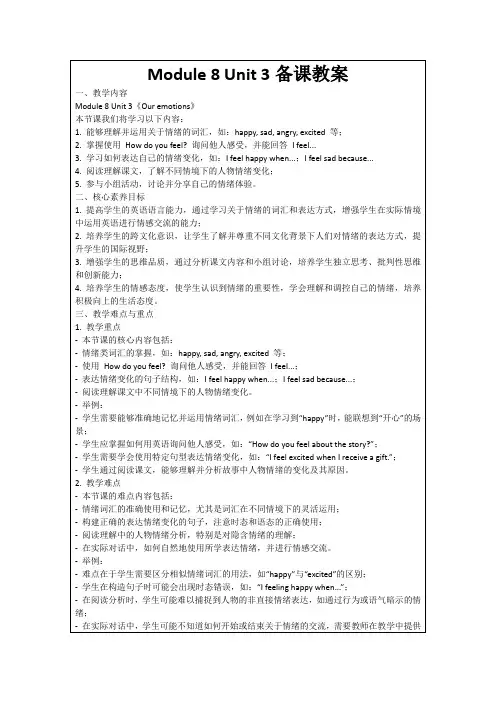
英3Uint10 Health and Leisure 健康与休闲--- Learning about personal fitness and dieting学习有关健身与饮食习惯的内容学习目标1.祈使句(表达指令)主语you省略, 谓语用动词原形; 肯定式用Don’t +动词原形. 表示频度的副词常放在动词前.Always take the stairs.Never go by car when could walk.祈使句多表达指令, 要慎用, 因为祈使句会给人以口气生硬的感觉. 为缓和语气, 可使用其他结构, 有礼貌地提出要求:Please could you…, please?Could you…, please?If I were you, I’d….Open the door, please, could you?2.用should提出忠告(表示“应该如何”)You should look for exercise opportunities all the time. The patient should not be moved.3.虚拟条件句/用虚拟条件句提出忠告真实条件句(Real Conditional /Sentences of Real Condition/ The 1st Conditional 第一条件句)【可能】虚拟条件句(Sentences of Unreal Condition)①与现在/将来相反的假设The 2nd Conditional②与过去相反的假设The 3rd Conditional 【不可能】If it rains tomorrow, we will stay at home.如果明天下雨,我们将呆在家里。
If it didn’t rain today, we would have a wonderful picnic.If it hadn’t rained last Sunday, we would have had a picnic.If he were here now, everything would be all right.If I had seen the ad, I would have applied for the job.虚拟条件句是虚拟语气(The Subjective Mood)的一种形式(谓语动词有时态/语态/语气的变化---都是谓语动词形式时态---不同时间发生的动作要用动词的不同形式表示(16); 语态---主语与谓语的关系:主动关系/被动关系(2);语气---表示说话的目的和意图:陈述/疑问/祈使/虚拟语气)虚拟语气的句型:①虚拟条件句中1.与现在/将来相反的假设2.与过去相反的假设【不可能】②宾语从句中wish /supposewould rather ①过去式(表现/将)would sooner +宾从had rather ②过完时(表过去)prefersuggest / advise / propose /建/提议ask / demand /require /request 请/要求+宾从(v原)petition恳求/请愿insist (或should +v原)desire 希望urge催促command /order命令intend vote投票(决定)③主/表/同位语/状语从句中It’s important /essential /vital /imperative(紧要的)/appropriate(合适的)that he work hard.Our suggestion /decision /idea /requirement is that (建议/ 决定/ 想法/ 要求)he take the 6:00 train.They made the suggestion /expressed the wish /passedthe resolution(决议)/raised the demand that the school remain closed.①过去式(表示现在)as if /though +从句②过完时(表示过去)③seem /look /taste /smell as if中也可用陈述语气I love you as if you were my brother.He talks as if he knew everything /he had been there.He looks as though he had known Jack for years.The milk smells as if it is sour.④It’s(high)time +定语从句(过去时)It’s time(that) we went home/were leaving/ordered dinner.It’s high time(that)you bought a new car /made upyour mind.⑤祝愿语中(多用v原,有些用May 开头)(May)God bless you. 上帝保佑你!God save all living things!愿上帝拯救众生Long live peace /Chairman Mao /Grandpa!May the New Year bring you success, joy & happiness.If I had the time, I’d make something better.我要是有时间, 就会做些更好吃的东西.If my grandmother were alive, I’d ask her.If you stretched before you start, you wouldn’t get sore muscles.If the machine were slower, you wouldn’t get dizzy.4.习语/句型/答案Actt.1 p.1641.the fittest =the fittest peoplethe +形容词, 表示某类人群: the poor/rich/young2.the key to long life 长寿的关键the key the exercises /doorthe answer to the questionthe note the textthe window the housethe legs of the deskthe monitor the computer注:to表示依附关系of表示组成关系3.irrespective of 不论/不顾/不考虑的=regardless of /whatever4.middle-aged 中年的5.be likely to do 很可能的/易于6.fitness expert 健康专家7.be better off (身体/经济)状况好的(be well off的比较级)8.non-smoker 不吸烟者9.endorse doing支持/赞同/认可(在票据背面签名/签署)10.to fly in the face of…公然违抗, 相悖,相抵触of 多指死于疾病(cancer /TB)11.diefrom多指死于疾病之外的其他原因(police gunfire)12.put pressure on sb(to do sth)= demand对…施加压力13.hard-sell 强行推销的14.junk food 垃圾食品议论文的常用句式(提出论点/论据):A /The(new)study shows 表明A /The survey found 发现A /The recent report predictedResearch(es))appears显示that…Statistics 统计数字sayGovernment figures - suggests建议in a recent survey discoveredA recent poll民意测验revealed显示It has been reportedAccording to sb/the reportResearchers discovered 发现Scientists concluded 得出结论A fitness expert said/ thinksMany experts believe /insist that…A spokesman stated /claimsA hospital reportedA TV executive explained/ point out主管Actt.11 p.17215.put on weight 增加体重lose weight 减轻体重/减肥weight goes up/down 体重增加/下降keep weight off 保持体重不增长be /go on a diet 进行节食began one’s diet 开始节食(diet特种饮食/保健食谱/吃限定食物)Actt.12 p.172Part A History of My Weight16.as a child 小时候17.I’ve got a history of18.I weighed 75 kilosI lost 13 kilos.I was around 58 kiloskeep a constant weight 保持稳定的体重19.in one’s 20s /twenties 在20多岁in one’s early 20s 在20出头in one’s late 20s 快30岁in one’s teens 十几岁(13-19岁)Part B 学习虚拟条件句Diet and Eating Habits 饮食习惯20.In the last two months I’ve been working very hardand I’ve always been eating on the go…(现在完成进行时)in the last/past/recent 3 years, ‘在过去/近3年来’,表示持续到现在的时间, 与完成时/完成进行时搭配on the go(口语)在进行活动, 匆匆忙忙的, 忙碌21.dairy products 乳制品22.I’m a vegetarian. 素食者, 不吃荤23.a couple of…一对/双; 几个, 三两个24.add up 合计, 累加起来25.I’d be a lot thinner. (a lot +比较级)下列词语常用比较级下列词语常用原级much verya lot quitestill rathereven +比较级so +原级far tooany(疑/否) a little /a bita little /a bit as…as…not as/so…as…26.虚拟条件句If I had the time, I’d make something better.If I didn’t drink so much, I’d be a lot thinner.If I get ten minutes at lunch time, I(will)run to the shop and I(will)grab a sandwich.(真实条件句)27.英文论胖瘦fat 肥胖的n. 脂肪obese 过度肥胖的n. 肥胖症(医生用语/正式)plump 稍胖, 丰满的chubby (婴儿/脸颊)胖得可爱的overweight 过/超重的thin 瘦(虚弱/不健康)bony (手/脸/人)瘦骨嶙峋的skinny 皮包骨的, 骨瘦如柴的slim /slender 苗条的(通过节食/underweightActivity 1Part B1. d2.e3.c4.f5.b6.aActivity 2Paragraph 11.key2. irrespective (of)3.discoveredParagraph 24. study5.start6.concluded7.endorsing8.trying Paragraph 39. prematurely 10.illnesses 11. overweightParagraph 412. putting pressure on 13 reduce 14 restrictActivity 31.Men who smoke are more lik ely to die if they don’t do exercise./Men who smoke are less likely to die if they do exercise2.The study was of 6000 middle-aged men.3.Dr Ken cooper agrees with the study.4.A previous study found different results.5.The British Government is putting pressure on manufacturers to reduce levels of sugar in food.Activity 4<1> Join <2>Be <3> Go <4> take<5> take <6> continue <7>Stick to <8>addActivity 5Part A1.-b2.-a3.-d4.-c5.-eActivity 61.Long trousers should keep your legs warm after exercise.2.You should do stretches before you start.3.You should drink water before and during exercise.4.If you feel dizzy, you should stop.5.The machine should be slower.6.You should eat an hour before going.7.You should go to the less popular classes.Activity 7Part B1.c (30,000)2.b (₤, million)3.c (60%)4.b ( Men:17%) f (Women:21%)5.a ( Men:1 in 5) e (Women:1 in 4)6.c (10%-40%)7.c ( More than doubled)Activity 91.₤2.5 million of public money is spent on obesity-relatedillnesses.2.Obesity has increased in the rest of Europe by 10%-40%.3.17% of men are obese in the UK.4.1 in 5 men will are obese by 2005.5.Obesity has more than doubled in the UK since 1980.6.1 in 4 women will be obese by 2005.7.21% of women are obese in the UK.8.60% of adults are overweight in the UK.Activity 111. (b) put on; weight2.(c) I’m on a diet3. (e) lose weight4.(f) keep weight off5. (a) weight goes up; (g) weight goes down6. (d) go on a dietActivity 12Part A1.75 kilos;2.75 kilos3.58 kilos4.58 kilosPart B5.a sandwich6.never7.a couple of glasses of wine8.at the weekendActivity 13stretched; wouldn’t get; you drank; wouldn’t get; were slower; wouldn’t getActivity 141.If you ate immediately after the session, you wouldn’tfeel sick.2.If you wore long trousers after exerci se, you wouldn’tget sore muscles.3.If you ate one hour before a session, you wouldn’t get sohungry.4.If you didn’t go to the most popular classes, therewouldn’t be so many people5.If you didn’t go so fast you wouldn’t get dizzy.Activity 15Part A1.Because Milly seemed upset./Because Milly had sent her an email2.She wouldn’t get so hungry at the gym.3.She wouldn’t get dizzy.4.She wouldn’t speak to Milly for weeks.Part B1.Why would it be better if you ate before you started?2.Could you get something to eat if you went to the gymafter work?3.And what would happen if the machines were slower?4.What would she do if she knew?Activity 161.What would I have I phoned a delivery service (forlunch)?2.Why would if be better if I drank water with wine (inthe pub)?3.What would I cook if I invited people to my house fordinner?4.What would I make if I brought a snack to work?5.Why would if be better if I had a diet coke in theevenings?Activity 191.have been advised2.have been sitting3.have been told4.have been going5.has been stopping6.have been reprinted7.has been taken8.have been phoningActivity 20Pat,Last time I saw you ,you didn’t look great. In fact you looked absolutely terrible!I’ve started going to the gym, and I’m on a diet and I’m feeling really good. I hope you don’t mind if I give you some advice.You should go to the gym.You should get a personal trainer.You shouldn’t take the life when you go upstairs.You shouldn’t take the bus to work. You should walk through the park.Always have fruit for breakfast.Never eat too much fat.I am sure that if you stuck to this routine for a month, you would see the difference. If you gave up smoking too, you would feel fantastic.Anyway, let me know how you get on. Good luck!Jim-end-。
Unit1. Talking About Yourself谈论自己Write a short passage by using the hints given to introduce yourself.(利用所给提示写一篇短文,介绍你自己.)Your can say something about where you are from,what you do for a living (typically what your job is),where you live and work,what your hobbies are,what kinds of entertainment,movies,sports,or books you are interested in,etc.Here is a list of expressions you may use when you are making a self-introduction: Giving you name.My name is……it means……Call me……Everyone calls me……Where are you from……I live in……I am from……I was born in……and live in……until I moved to……when I was……My hometown is……Where you work/study……I am a long distance learner at……I am majoring in……My major is……I work for a company called……I am in business as a trader.My primary job is……Introducing your family.I am married and have two children.My family members are……I have one older brother and two younger sisters.Talking about hobbies/things you like.I started playing piano when I was in the third grade.My hobby is listening to rock music.What do you do in your spare time?We have been very involved inMy favorite kind of computer games are action games,such as……Talking about Myself’’’m a math teacher in a primary school.My school is far away from my home,so I usually drive to work.There are three people in my family.They are my wife,my daughter and I.My wife is a doctor in a big hospital and my daughter is a ten-years-old pupil.In my spare time,I like reading books,watching TV,playing table tennis and so on.I used to go fishing in the weekend,but I don’t now because I have to attend class in the TV University.Unit2.Family Influences家庭影响Write a short passage by using the hints given to describe your family and its influence.(利用所给提示写一篇短文,描述你的家庭和它对你的影响.)used to be a senior engineer.would work in a factory.is very serious about everything.pay attention to the details.take after.have influence upon.looks like.My FamilyThere are five persons in my family.My parents,my wife,my daughter and I.My father used to be a senior engineer.His responsibility was designing new machines.My mother would work in a factory.They are retired now.My father is very serious about everything in life and pays attention to the details.My mother is patient and hardworking.I take after my parents.They have influence upon me to make me a good teacher.My wife is a nurse and she is very busy everyday.My daughter is a pupil.She is pretty and lovely and looks like her mother.Unit3.Society and Family Life社会与家庭生活Write a short passage by using the hints given to describe your family life.Describing your daily routines in the morning,evening and so on.pick up my daughter(接女儿)do some grocery shopping〔买菜〕be good at cooking(擅长做饭〕Current affairs(时事〕My Family LifeLike most ordinary Chinese families,my family life is busy and meaningful.My family members often get up at about six o’clock in the mornings.My wife deals with my little kid’s chores while I’m cooking the breakfast.I drive my daughter to her school and then to my work.My wife takes the subway to her hospital.Around 4:30p.m,I pick up my daughter and do somegrocery shopping.My wife is good at cooking.So when we arrive home,a delicious meal is waiting for us.During the eating,we chat about interesting things from our daily life and discuss current affairs.We go to bed at 10p.m.Unit4. Changes in My Life生活中的变化Write a short passage using the hints given to state changes in your life.There have been many changes in my life(生活发生了许多变化)be better of(生活状况更好)preserved pickles(咸菜)move from a cramped and gloomy room to a big and bright flat(从狭窄阴暗的房间搬到大而明亮的单元房)getting around(出行)Changes in My LifeThere have been many changes in my life.With the development of the economy,my life is better off.For clothing,I have spare money to buy sorts of pretty clothes.But in the past,there were fewer clothes in my wardrobe.For food,I usually had traditional Chinese food for every meal,rice,noodles or a steamed bun with one or two light dishes such as preserved pickles.Nowadays,I can afford any delicious food,including western foods.For housing,I have moved from a cramped and gloomy room to a big and bright flat.For getting around,I robe an old bike on my way to work a year age.At present,I drive my private car to travel.I believe my life will be better and better in the future.Unit5.Ambitions and Dreams抱负与理想Write a short passage using the hints given to state your ideal job.in great demand(很大需求)a good eye for detail(细致缜密)a sharp mind(思想敏锐)an excellent memory(记忆力强)like taking responsibility(喜欢承担责任)be planning to(计划做……)open a law firm(开办律师事务所)My Ideal JobEverybody has his dream for his career in the future.He or she might want to be a teacher,a doctor,a scientist,and so on.My ideal job is to be a wyers,especially those familiar with global laws and fluent in foreign languages,will be in great demand.I have a good eye for detail,a sharp mind,an excellent memory and like taking responsibility as well.So I think I would make a good lawyer.I am planning to open a law firm by myself some day.But now I must study hard to get myself qualified for my future job.Unit7.An Englishman’s Home is His Castle我爱我家Write a short passage using the hints given to describe your home.Tower building(塔楼高层建筑)block of flats(公寓楼)in the north of city(城北)square meters(平方米)had the window frames painted(让别人刷窗框)be satisfied with(对……满意),need to……neighbourhood(小区)cozy(温暖而舒适)My HomeI am living on the 10th floor of a tower building with my wife and daughter.It is a newly-build block of flats with 22 stories altogether in the north of the city.We have three bedrooms,one big living-room,one kitchen and two bathrooms.The size is about 127 square meters.When we moved in three years ago,I painted the doors myself,but I had the window frames painted.We are satisfied with the decorations except the cupboards in the kitchen,so I need to built them again.The neighbourhood is nice too.I think my home is cozy and I like my home.Unit8.Leisure,Work and Animals休闲生活与宠物Write a short passage using the hints given to state the benefits of having some hobbies.benefit from(从中受益)in my spare timeraising flowers(养花)cycling(骑车)maintain a mental and physical balance(保持身心健康)My HobbiesHobbies are activities from which one can benefit a lot.In my spare time,I like painting,singing,raising flowers and cycling.My hobbies help me relax after periods of hard work.Moreover I can make many friends who share the same hobbies with me.My hobbies help me maintain a mental and physical balance.As you can see,hobbies can be relaxing,challenging,interesting enjoyable or educational.So everyone should have one or two hobbies,then the life is meaningful and amusing.Unit9.The Olympic Games奥运会Write a short passage using the hints given to state your favorite sport and the reasons why you like it.it is good for keeping fit(有利于保持健康)lose one’s weight and be graceful in form(减肥和保持优美体型)spotted among the residential areas(散布在居民区)swimming is especially refreshing(游泳尤其能让人精神焕发)My favorite SportMy favorite sport is swimming.There are three reasons why I like the sport best.First,it is good for keeping fit.It benefits the heart,the lungs(肺)and the limbs(四肢).Thanks to the sport,I lost my weight and am graceful in form.Second,it is easy to find a place to swim.In the country,I can swim in lakes and rivers.In the city,there are many swimming pools spotted among the residential areas.Third,it can be done in any weather.It is very cool swimming in hot summer.In cold weather,swimming is especially refreshing. Swimming is a very popular sport.I hope you can enjoy it too.Unit10.Health and Leisure健康与休闲Write a short passage using the hints given to state addition offer some suggestions.Eating habits closely related to health Keep fit First……second……third……overweightMalnutrition(营养不良) lose appetite(失去胃口〕Health and Eating HabitAn eating habit is closely ralated to health.In order to keep fit,we should pay more attention to our eating habits.My suggestions for a good eating habits are as follows:First,don’t eat to much or too little for each meal.Eating to much will cause overweight and eating to little,malnutrition. Second,don’t eat between meals.Sometimes we like eating biscuits and chips before the mealtime;as a result,we lose our appetite for lunch or dinner.Third,eat more vegetables and fruits everyday.In my opinion,a good eating habit leads to a healthy life.Unit11.Healthy care,and Travel and Health健康与保健Write a short passage using the hints given to state how to keep healthy.it is necessary to keep a balanced diet. Shouldit is important to do regrlar exercises.it is essential to keep in good spirits/in a positive mood.renew our spirits and release our stress.be bound to keep healthy.How to Keep HealthyNowadays,more and more people know the importance of keeping healthy.Without good health,we can do nothing.For me,there are mainly three ways to keep healthy.First,it is necessary to keep a balanced diet,which is the basis of good health.We should have plenty of fruits and vegetables everyday.Secondly,it is important to do regular exercises,such as swimming, jogging and so on.Last but not least,it is essential to keep in good spirits.Relaxation and entertainment are ways to renew our spirits and release our stress.When we make healthy habits a part of our everyday life,we are bound to keep healthy.cation at School and University学校教育Write a short passage using the hints given to state the difference between high school life and college life.is quite difference from.have to,mustask students to do many tasksbe responsible forfor exampleput onspend more time studing by themselves.High School Life and College LifeHigh School Life is quite different from College Life.In high school,the students have to wear school uniform.Teachers always ask students to do many tasks in the classroom and supervise students behavior in detail.In college,students have to be responsible for themselves.They have more freedom in college than in high school.For example,they put on the casual clothes instead of uniform.Tutors give them letures and assignments,and they must spend more time studying by themselves in the library.That means students must manage themselves very well.Although I often recall my high school life,I like college life more.Unit14.Learning and Learning Styles学习与学习方式Write a short passage using the hints given to describe the life in your TV university.be engaged in long distance education.web-based courses.Join online discussion forums.Send our homework to the tutor.Solve the difficulties and puzzles in the tutorial.My TV University LifeOur TV University is mainly engaged in long distance education.The form of study is very convenient for adult learners like me.I can learn my courses anywhere in my spare time by computer.There are many Web-based courses and sources on line. Moreover,I not only use email to send our homework to our tutors but also join online discussion forums.Meantime,the difficulties and puzzles can be solved in the tutorial once a week.The e-learning life is meaningful and demanding.I enjoy my TV University Life.Unit 15.Town Life城市生活Write a short passage using the hints given to state the advantages and disadvantages of living in a big city.City life is attractive with all its advantages and conveniences.Supermarket of shopping malls.dine out(外出吃饭)expansion(扩张) of the cityflowing into(涌入)Living In A Big CityIn the eyes of many people,city life is attractive with all its advantages and conveniences.People can buy almost all kinds of things at supermarkets or shopping malls,dine out in good restaurants;and more important,they can have more educational opportunities.However,with the expansion of the city,more and more people are flowing into the big city,the traffic is heavier and heavier,the pollution is more and more serious,and the living condition is worse and worse.Most people love the advantages of city life,but a big city also has its disadvatages.Unit 16.Girme and Justice犯罪与司法Write a short passage using the hints given to state how to help elderly people and solve the problem of an aging society. China has stepped into an aging society.〔中国步入老龄社会〕According to traditional Chinese moral values.〔按照中国传统价值观念〕The family plan has been carrying out for many years.〔计划生育制度实行多年〕Eatabish a multi-level old-age insurance system.〔建立多层次的老龄保险制度〕Help for Elderly peopleIt is reported that China has stepped into an aging society.As the aging of the population quickens,the number of elderly people is becoming very large.Therefore,it is necessary to find good ways to deal with the problem.According to traditional Chinese moral values,it is the sons or daughters who should take the responsibility of caring for their elderly parents.The youth should not only look after their elderly parents in material terms but also understand their lonelines and do their best to spend more time with them.But because the family plan has been carried out for manyyears in China,it is a common picture that a young couple has to support four elderly parents.This trend will reach its peak in coming years.The goverment is responsible for guaranteeing the basic living standards of the elderly and safeguard their legitimate rights and interests and establish a multi-level old-age insurance system.Unit 17.Live and Let Live和谐共处Write a short passage using the hints given to describe your experience in learning english.be independent in english studiesan active english learnerenjoy the pleasure of english studiesbear in mind(牢记)My English studiesI have been learning English for more than twenty years.Recalling my English studies,I would like to share some good ways and some frustrations with you.First,I am independent in English studies.Instead of waiting for the teacher to explain,I try to find the patterns and rules on my own.Secondl,I am an active English learner.I never wait for a chance using English.I look for such a chance,and create an language environment by myself.I am willing to make mistakes and not afraid of losing face.Try your best to enjoy the pleasure of English studies,bear in mind that“frustration gets you nowhere”(焦虑于事无补).。
Module 8 Unit 3 Language in use一、教学内容:Unit3 Language in use二、课型:Revision and application三、教学目标:1.能够正确使用本模块的新单词以及短语。
2.能够正确用that来引导宾语从句。
3.能利用所学语言知识介绍自己的家乡名胜,从而增强学生的环保意识和对祖国山河的热爱。
四、教学重难点:1.能够正确用that来引导宾语从句。
2.通过听、说、读、写。
让学生正确练习宾语从句。
五、教学准备:本节课型为Revision and application,根据新课标的要求,结合教材和学生特点,主要采用任务型互动式进行教学,结合情景法、交际法、听说法、归纳法等教学方法实施课堂活动,开启学生思维,通过一系列有条理的教学活动,引导学生自主探究学习和与他人互动合作学习,让学生体验愉快学习。
本节课所需教具及资料:幻灯等。
六、教学过程:教学活动教学活动教学步骤教师活动学生活动设计意图Step 1Lead-in andpre-task(2’)Revision:1.Let students look atthe pictures andanswer the questions.(1)Would you like togo to the beach?(2)Would you like tovisit thecountryside?(3)Would you like togo to a big city forholiday?(4)What aboutclimbing mountainsfor holiday?2.Ask the students toread the languagepractice together.anize the Ss tohave a competitionbetween boys and girlsto say say out as manyas the object clausesthey can.Revision1.The students look at thepictures and answer thequestions.(1)Would you like to go tothe beach?(2)Would you like tovisit the countrys ide?(3)Would you like to goto a big city for holiday?(4)What about climbingmountains for holiday?2.The students to read thelanguage practicetogether.anize the Ss to havea competition between boysand girls to say out asmany as the objectclauses they can.通过这三个活动使内容和宾语从句双巩固,也就是说在话题中巩固语法,在语法操练中使学生对课文内容有了更深层的理解。
Unit8 To ind them that the houd ue the ame tene in the obect caue a the main caueConoidation 10 minute1 The teacher ain caue are in the e it5 The teacher et tudent read the converation b themeve and number the entence to mae a converation6 The teacher et two tudent te the anwer And et them introduce their method of oving uch7 The teacher et tudent inute1 The teacher a the tudent to read and undertand the eam um uain caue are in the a give them a hand if necear2 The teacher et tudent a and anwer in carefu and correct the wrong e eore attention to the tene3 The teacher a two tudent to write down the brief converation on the bacboard Chec the anwer together with the tudent4 The teacher ead the tudent to e of a the cothe in 3 A one b one5 The teacher how the name of the five mode Then iten to the atch the mode with their name6 The teacher a two tudent to te their anwer7 The teacher inute1 The teacher how a a ae the ef or heref A the tudent to dicu the fahion how at wee Let them a and anwer in grou ewor4 The teacher how the ummar of thi ection to the tudent5 The teacher aign homewor:1 Review the ummar after ca2 Search ome ain caue are in the ain ore eercie in the rea cene Teacher ma et more cene for the tudent to mer Fa Wintercarf, T-hirt, hort, irt, weater, acet, ean, overcoat, boot, gove,ean,windbreaer,。
英3Unit 8 Leisure, Work and Animals 休闲活动与宠物--- Looking at leisure activities and animals as pets orfor work 学习有关休闲活动及宠物与人的关系的内容学习目标1.表示数量a large proportion of…很大比例的a small proportion of…很小比例的the majority of…多数的a minority of…少数的half the… 一半的a third of… 三分之一的a quarter of… 四分之一的over…多于more than…under…少于less than…2.spend time doing(in)doing sthspend time/moneyon sthJack spends under a third of his free time doing housework.Jack spends a large portion of his time sleeping.3.现在完成时和现在完成进行时现在完成时--- 强调动作的结果,表示动作已经结束现在完成进行时--- 强调动作从过去一直持续到现在,并且还要继续下去She has sorted out all the books and pictures. (已经)She’s been reorganizing the shop. (一直)Where has he been livin g?Who have they been working for?He hasn’t been working here for very long.注:状态动词可用于现在完成时,但不可用于现在完成进行时(love, like, hate, be, think认为/feel /hear/want)I’ve always liked animals.4.for和since表示时间for +时间段(①从过去到现在②过去③将来的一段时间)since +时间点(从过去某一时间点起到现在)(短语/句子)Franco: I lived in Sicily for 18 years. I came to London when I was 18. I’ve lived in England now foralmost 30 years.He's been here for ten minutes.He was here for ten minutes.I’m staying in Beijing on busines s for two weeks next month.I’ve been living here for three months / since last March. Since it started raining, I’ve stayed in the house.注: for和since与延续性动词搭配非延续性动词肯定式不可与其搭配(否定式可以)He has come here for two days. (×)He has been here for two days. (√)She hasn’t come here for two days. (√)I’ve not seen him since last week.5.词语比较/习语/句型/答案ed to do 过去常常做…be used to sth /doing 习惯于…2.because of +名词because + 句子3.the number of……数字/目(作主语时,谓语用单数)a number of…一些…(作主语时,谓语用复数)(in)doing sth4.spend time /moneyon sthpare A to B 把A与B相比; 把A比作Bcompare A with B 把A与B相比6.the majority of… 多数的a minority of… 少数的Actt.1 业余活动/描述发展趋势/表达数量p.126After hoursernment figures (in a recent survey) show that…8.after hours 工/业余时间9.for an average of three hours a day平均每天三个小时10.in /during the last /past 30 years 30年来/在过去30年间(常与完成时搭配)In the last more than 20 years great changes have taken place in China.11.because of +名词because + 句子12.washing machine 洗衣机microwave = microwave oven 微波炉vacuum cleaner 真空吸尘器13.etc = etcetera /it`set rə/ 等等14.the number of……数字/目(作主语时,谓语用单数)a number of…一些…(作主语时,谓语用复数)15.stereo / `st iəriəu/ 立体声的→立体声唱机16.leasure activity /time休闲活动/时间(in)doing sth17.spend time /moneyon sth18.55-64 year-olds = 55-64 year-old peoplepare A to B 把A与B相比; 把A比作Bcompare A with B 把A与B相比20.复习表示发展趋势动词This figure has fallen dramaticallyThe number of TVs…has also risen sharply…listening to tapes and records decreases with agegardening for pleasure rises sharply名词because of the increase in labour-saving devicesKEY1.They do less because of the increase in labour-savingdevices.s, stereos, videos, CD and DVD players, etc.3.More people watch TV.4.Older people.Animals at home21.range from…to…在一定范围/幅度内有所变化22.tropical fish 热带鱼23.changes (in life style and the family structure)have made24.分数表示法: 分子用基数词, 分母用序数词,分子与分母常用连字符(-)连接, 如果分子大于1, 分母用复数1/3 →a /one third2/3 →two-thirds3 2/5→three and two-fifths一些习惯用法:½ →a /one half¼ →a /one quarter // one-fourth¾ →three-quarters2 ¼ →two and a quarter1 ½ →one and a half7 ¾ →seven and three quarters较复杂的分数:23/9 →twenty-three over nine76/92 →seven-six over ninety-two25.数量表达方式:(see学习目标1)KEY1.Just under half of households have a pet.2.Dogs used to be the most popular pets. /Cats are themost popular pets.3.Cats need less care than dogs.4.Most dog owners have(only)one dog.5.More than /Over a third of cat owners have two or morecats.6.More than /Over half of dogs in the UK are pedigree.Actt.2 表达数量p.1291.A large proportion /The majority of households have amicrowave oven.2.More than half of managers have a dishwasher.3.Just under a quarter of unskilled workers’ householdshave a dishwasher.4.The majority / A large proportion of men have donesport in the last week.5.A minority of women have done DIY in the last fourweeks.Actt.3 表达数量p.129Part A1.Jack spends under a third of his free time doing housework.2.Jack spends a small proportion of his free time seeing friends.3.Jack spends a large proportion of his time sleeping.4.Jack spends the majority of his free time watching TV.5.Jack spends over a quarter of his free time studying. Part B 写作---应用表达数量的词语描述时间安排Actt. 4 Extt.1 分数表达p.1301.What’s the ownership of video recorders?About four-fifths of households own a video recorder. 2.What’s the ownership of pets?About half the households own a pet.3.What’s the ownership of personal computers?Under a third of households own a personal computer.4.What’s the ownership of microwave ovens?Over three-quarters of households own a microwaveoven.5.What’s the ownership of dishwashers?About a third of households own a dishwasher.⏹Actt.5 Extt.2 完成时/完成进行时p.1311.She does voluntary work on Saturdays.2.It is called Animal Welfare.3.She works in a charity shop.4.She does it because she likes animals.5.Yes, she has.6.She has sorted the books and pictures out.⏹Actt. 6 Extt.2听写填空完成时/完成进行时p.1311.work2.haven’t; for3.been; furthered4.worked; shops in London5.liked; since; I’ve6.reorganising; sorted outActt. 7 完成时/完成进行时p.132Part BI’ve been running long distance races for five years. I’ve been training with a local running club since last summer, and I’ve been preparing for the London Marathon. I’vecompleted two half-marathons. In the second half- marathon I got the best time in the whole club. Recently I’ve been building my muscles by going to the gym to increase my stamina(耐力).Actt. 8 写作,用完成时/完成进行时写段有关自己爱好的短文p.133⏹Actt. 9 Extt. 3 现在完成进行时p.1331.What have you been doing?I’ve been writing a letter.2.Have you been listening to the radio?No. I haven’t been listening to the radio.3.Have you heard the news?No, I haven’t heard the news.4.How long have you been studying English?I’ve been studying English for three years.5.Have you been waiting long?Yes. I’ve been waiting since 5 o’cloc k.6.Have you read this gook?Yes. I’ve read it.⏹Actt. 10 Extt. 4 spend time doing p.1341.How many hours do you spend watching TV?2.Do you spend more time reading or seeing friends?3.How often do you listen to music?4.How many hours a week do you spend doing sport?Actt. 11 复习定语从句, 练习完成进行时p.135 26.Did you know…?询问对方是否知道/听说了某事,是习惯用法, 与过去时无关, 其后可跟各种时态= Has the news reached you?27.people with mental illnesses 患有精神疾病的人28.separate(…)from 与…分开29.in hospital (生病)住院in a /the hospital 在医院Such as:go to school 去上学go to the school 去学校go to church 做礼拜go to the church 去教堂但go to the cinema 去看电影30.take the case of sb 以某人的情况为例31.She(The dog)helps me to get dressed对所喜爱/崇敬的事物用she指代Fill her up, please. 请给加油(her指my car)I love China. She is a great country.本文中的she表示喜爱, 也表示这是一只she-dog32.go into a coma 陷入昏迷状态be in a coma 处于昏迷状态33.alert(sb to sth)警报/告; 警觉的alarm 警报, 警报器,闹钟,惊慌alter 改变34.my blood sugar level dropped 血糖降低了He gave me an insulin injection他给我注射了一针胰岛素KEY1.Yes, they are.2.They think that it’s good. /They recognise the benefits ofpets.3.Children, people with mental illnesses and elderlypeople who are separated from their own pets or have had to give up their pets.4.He started to speak.5.They are with them.6.He got it from Dogs for the Disabled.7.1) She helps him to get dressed, and she brings him hissocks and shoes.2) She fetches the newspaper from the shop.3) She passes him the phone when it rings.8.She got his neighbour.Actt. 12 同义词练习p.137Part A1)recognise2)separated from3)mental illnesses4)volunteer5)altered6)fetches7)dropped8)neighbourPart B1)neighbour2)volunteer3)separated4)mental illnesses5)fetches6)dropped7)altered8)recognisesActt. 13 复习定语从句p.1381.Dogs that / which help sick people work in hospitals.2.Dogs that /which disabled people use are specially trained.3.The dog which /that the disabled man stroked helped him speak.4.Doctors who /that have seen dogs help people begin to recognise the benefits.5.Volunteers whose dogs and cats help people work in the hospitals with the animal.6.The dog that /which assists Alan a lot came from a charity.7.The person who /that the dog fetched gave Alan an injection.8.The hospital staff who have tried working with dogs have reported good results.Actt. 14 警犬训练p.138Part A1)abilities2)bite3)criminals4)people5)oldActt. 15 Extt.5 p.1391.B2.C3.C4.A⏹Actt. 16 Extt.6 p.1401.T.2.F. “We are provided with a kennel(狗屋/窝)that staysin the garden and all food.”3.F. “The dogs are not aggressive.”4.T.5.F. “My dog barks when I’m wearing my uniformbecause he’s very excited.”Actt. 17 p.140The policeman’s name is Simon Woodrow and he works for the Thames Valley Police. He supervises 10 dog handlers who work all over Buckinghamshire. The dogs have natural abilities to search for people and find people and bite. The police dog team searches for an armed criminal when the police officers can’t find him. The dogs live with the handlers, but they sleep in a kennel in the garden. They bark when they see the handler coming because they are excited about working.⏹Actt. 18 Extt.7 p.1411.How long has Tess been helping Alan for?She’s been helping him for three years.2.For how long has Alan been visiting hospital everymonth?He’s been visiting hospital every month for four years.3.How long has Alan been having injections?He’s been having injections since 1996.4.How long has Sergeant Woodrow been working in thepolice force?He’s been working in the police force since 1994.5.For how long has he been training dogs?He’s been training dogs for five years.6.For how long has he been supervising other policeofficers?He’s been supervising them since 2001.。